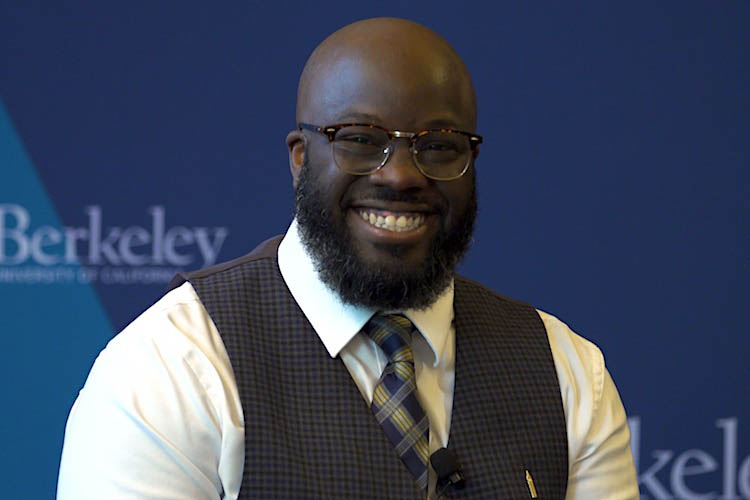What makes a Berkeley student? Olufemi “Femi” Ogundele weighs in
New director of undergraduate admissions explains in Campus Conversation

August 30, 2019
If you’re looking for the chance to change society for the better, work in the admissions office at a big public university.
At least that’s what Olufemi “Femi” Ogundele, director of UC Berkeley’s Office of Undergraduate Admissions, told an audience of students, staff and faculty this week at a Campus Conversations event.
“If you’re looking for an opportunity to make a real change in this society, you need to go and work at a public school,” he said on Wednesday, kicking off the fall semester’s series of Campus Conversations, where top Berkeley leaders take questions from staff, faculty and students.
Small, private colleges and universities have plenty of money and aren’t bound by laws that limit the consideration of an applicant’s race, gender or ethnicity, said Ogundele, who previously served as assistant dean of diversity outreach and external relations at Stanford University.
But those schools’ small student populations make it hard to welcome large numbers of first-generation or underrepresented students, he said.
“When your entire student body is the size of our freshman class, how much actual change, when you talk about society, are you making?” he asked.
Berkeley is welcoming 6,400 first-year students this fall, according to campus data. Almost 25% of them are first-generation students, and 18% are from underrepresented minorities. The entire undergraduate student body at Stanford, by comparison, has 6,700 students.
Over the course of the hour-long conversation, Ogundele, who started his post in January, talked about his first impressions of Berkeley, what admissions officers are looking for in applicants, the use of the SAT in admissions and the larger landscape of higher education.
Ogundele said he is paying particular attention to building a diverse undergraduate student body, a priority of Chancellor Carol Christ.
“All of the data in every sector of our society shows that diverse environments and spaces drive innovation,” he said. “They are the places where genius can be found.”
But what effect does Proposition 209, a 1996 California law that prevents public institutions from considering race, sex or ethnicity in employment or admissions, have on that recruitment effort?
Less than you would think, said Ogundele.
“I’m less interested in what we can’t do and more interested in what we can do,” he said, pointing to outreach efforts and events like Cal Day, which have been redesigned to focus on admitted students.
“When you are evaluating students, and you don’t have race or gender as a marker in the application, it actually requires you to have a deeper understanding of what you’re reading,” he continued. “Having to go in and learn the other parts of a student and the things that make them compelling is important.”
Berkeley’s admissions office strives to build a holistic picture of a student that is much more than the applicant’s academic record, Ogundele said.
“We’re not just interested in what you’ve done, we’re interested in who you are,” he said. “A student is more than two numbers, a GPA and an SAT score. We’re talking about excellence, not perfection.”
And how, Ogundele was asked, does he define what makes a Berkeley student a Berkeley student?
“I’m looking for an impatient trail blazer,” said Ogundele.
The next speaker in the Campus Conversations series will be Oliver O’Reilly, chair of the Academic Senate, who will speak Sept. 30 with ASUC President Amma Sarkodee-Adoo.